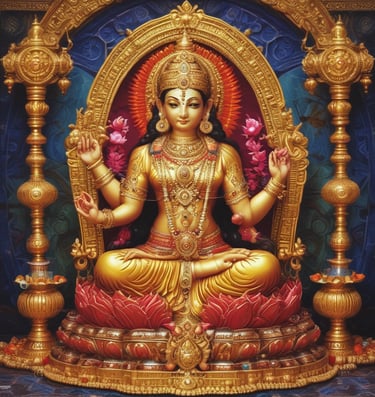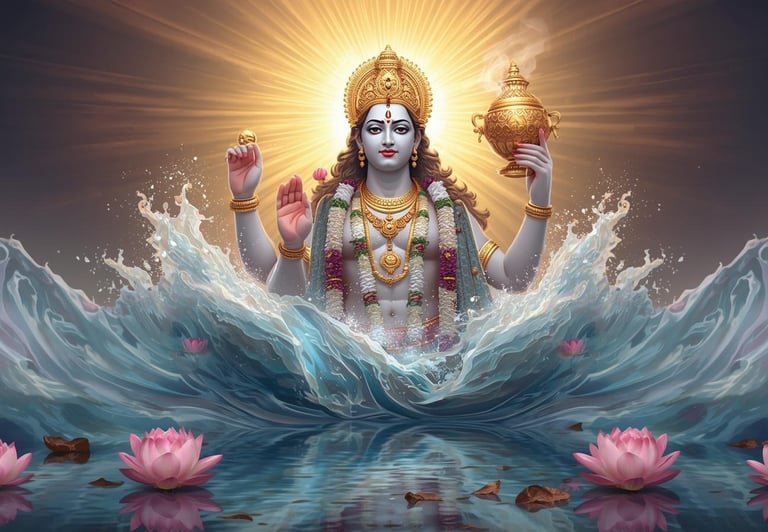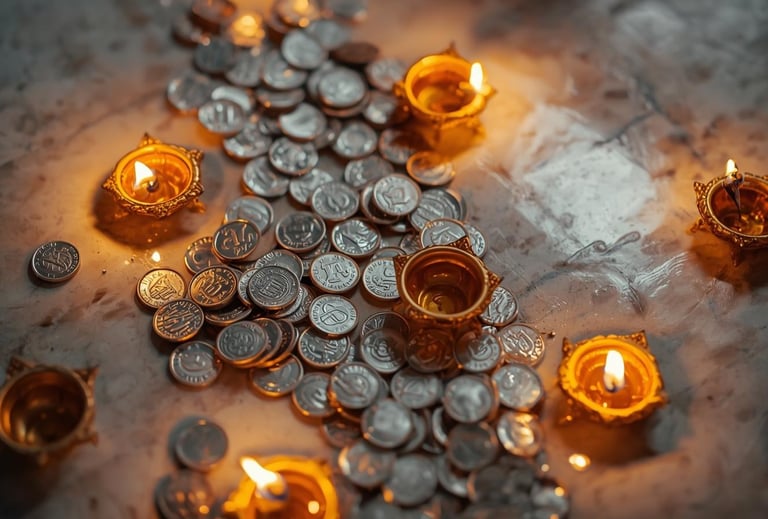Dhanteras: The Day of Divine Wealth and Inner Prosperity
Diwali is Festival of Positive Energy, Part 1
Gajanan L. Bhonde
10/18/20259 min read


Understanding Dhanteras
Dhanteras marks the beginning of the five-day Diwali festival celebrated across India, signifying the arrival of prosperity and well-being. The festival is attributed to Lord Dhanvantari, who is revered as the divine physician and the god of Ayurveda. According to Hindu mythology, it is believed that on this day, Lord Dhanvantari emerged from the ocean during the churning of the sea, carrying a pot of nectar which symbolizes health and wealth. This origin story not only highlights the significance of health in the celebration of wealth but also establishes Dhanteras as a pivotal starting point for the festivities that follow.
Traditionally, people celebrate Dhanteras by purchasing precious metals such as gold and silver, which signifies the invocation of wealth and is believed to bring good fortune. The act of buying new items on Dhanteras is deeply rooted in the cultural belief that it attracts prosperity at home. Families also indulge in cleaning and decorating their homes to welcome Goddess Lakshmi, the deity of wealth, who is worshipped during the Diwali festivities. The festival thus serves a dual purpose of preparing for the upcoming Diwali celebrations while paying homage to health and prosperity.
The rituals associated with Dhanteras include the lighting of lamps and candles, symbolizing the dispelling of darkness and ignorance. Devotees often offer prayers and perform rituals for the well-being and longevity of their loved ones, demonstrating the festival's emphasis on inner prosperity. The day is imbued with a sense of optimism and hope as families gather to share joyful moments and invoke blessings for a prosperous year ahead. As such, Dhanteras lays the foundation for the ensuing festivities of Diwali, uniting themes of health, wealth, and familial bonds that permeate the celebrations.
The Spiritual Significance of Dhanteras
Dhanteras, marking the onset of the five-day Diwali festival, holds profound spiritual significance in Hindu culture. This sacred day is dedicated to Lord Dhanvantari, the divine incarnation of Ayurvedic medicine, who is revered for bringing forth health and well-being. His emergence from the ocean of milk during the churning of the cosmos symbolizes the arrival of not just material wealth, represented by gold and silver, but also the essential health that forms the foundation of true prosperity.
While the physical accumulation of wealth is celebrated through the purchasing of new items, particularly metals like gold, the deeper spiritual teachings of Dhanteras focus on internal richness. This day serves as a reminder that genuine wealth encompasses good health, mental peace, and a sense of gratitude towards life’s blessings. Embracing these values fosters a holistic sense of prosperity that transcends mere financial accumulation. Gratitude, for instance, can shift one’s perspective from scarcity to abundance, illuminating the myriad joys that life offers beyond material possessions.
Moreover, the lighting of diyas and offerings made during Dhanteras are not only rituals performed for divine blessings but are also reflective practices that guide individuals towards self-awareness and mindfulness. This encompasses recognizing the importance of health, both physical and spiritual, which in turn enriches one’s life experience. Through the lens of spirituality, Dhanteras encourages us to understand that prosperity is a balance of external wealth and internal well-being.
Thus, as devotees honor Lord Dhanvantari on this auspicious occasion, it is essential to cultivate a mindset that appreciates health and gratitude, embracing these elements as integral to one’s definition of wealth. Such an approach not only enhances individual lives but also contributes positively to families and communities, fostering an environment of shared prosperity and well-being.
The Concept of Inner Prosperity
Inner prosperity is a concept that transcends the mere accumulation of material wealth and delves into the realms of emotional and psychological well-being. It embodies a sense of fulfillment that arises from self-awareness, gratitude, and a positive mindset. While societal norms often equate success with financial gains, true abundance encompasses a holistic approach to life that nurtures one's inner self.
At the core of inner prosperity lies self-awareness, which allows individuals to understand their values, desires, and emotional triggers. This heightened level of consciousness enables people to navigate life’s complexities with clarity and purpose. Embracing self-awareness can lead to improved decision-making, fostering personal growth and resilience in the face of challenges. By focusing on the internal rather than the external, individuals can cultivate lasting contentment that is not swayed by fluctuations in material circumstances.
Gratitude also plays an essential role in nurturing inner prosperity. By acknowledging the positive aspects of life, individuals can shift their perspective from what is lacking to what is present. This shift creates a foundation of appreciation that enhances overall happiness. Research has shown that individuals who regularly practice gratitude experience increased levels of well-being, which in turn contributes to their capacity for success in various life areas.
Moreover, maintaining a positive mindset is crucial for fostering inner prosperity. A constructive outlook encourages resilience and enables individuals to view setbacks as opportunities for growth and learning. Cultivating a positive approach not only enhances personal satisfaction but also enriches relationships and interactions with others. Therefore, by prioritizing self-awareness, gratitude, and a positive mindset, one can develop a profound sense of inner prosperity that extends beyond material possessions, leading to a more fulfilling life experience.
Traditions and Customs of Dhanteras
Dhanteras, celebrated two days before the festival of Diwali, holds significant importance in the Hindu calendar. This occasion is dedicated to the worship of Lord Dhanvantari, the deity of health, and Lakshmi, the goddess of wealth. Traditionally, it marks the beginning of the five-day Diwali festivities, melding themes of prosperity and well-being. The rituals observed during Dhanteras are deeply rooted in cultural heritage and are a reflection of community values.
One of the most recognized customs is the purchase of precious metals, predominantly gold and silver. It is believed that buying these commodities during Dhanteras brings good fortune and prosperity for the year ahead. Many families invest in jewelry, coins, or utensils, considering such purchases not merely as financial investments but as auspicious symbols of wealth. By choosing products that hold significance, individuals can participate in this age-old tradition while aligning it with personal preferences.
The lighting of diyas, or oil lamps, is another poignant part of Dhanteras. This practice symbolizes the dispelling of darkness and ignorance. On this evening, households light up their entrances to welcome prosperity and positivity. Using eco-friendly materials for diyas can enhance one's connection with nature, a practice increasingly appreciated in modern times. Additionally, the act of decorating these lamps with flowers or colors adds a personal touch that resonates with individual creativity.
Moreover, worshipping deities associated with wealth and well-being plays a pivotal role in Dhanteras. Families often set up elaborate puja (worship) spaces adorned with flowers, fruits, and sweets. By sincerely participating in these rituals, individuals not only seek blessings for material wealth but also spiritual enrichment. Engaging in community gatherings or family rituals fosters a deeper shared understanding of these practices, promoting collective joy and prosperity.
Cleansing Negative Energy
As Dhanteras approaches, many individuals seek methods to cleanse negative energy from their lives, paving the way for new beginnings. This period signifies the onset of prosperity and well-being, making it an opportune time to engage in activities that enhance spiritual and emotional resilience. One effective technique is meditation. By dedicating time each day to sit quietly, focusing on breathing, and reflecting on personal intentions, practitioners can cultivate a sense of clarity and peace. Meditation assists in releasing built-up stress and negativity, allowing for a fresh perspective on life’s challenges.
Another powerful method for cleansing negative energy is decluttering one’s living environment. Physical spaces can often mirror our internal state; a cluttered space may lead to a cluttered mind. By systematically addressing unwanted items, individuals not only create a more serene environment but also symbolically release emotional baggage. This practice aligns with the spirit of Dhanteras, which is all about celebrating abundance and joy. A tidy, organized space fosters a sense of well-being and encourages positive energy to flow more freely.
Engaging in acts of kindness can also be immensely beneficial for fostering inner peace and positivity. Whether it is helping a neighbor, volunteering in the community, or simply offering words of encouragement to others, these actions signal a shift from self-centered worries to broader community insights. Kindness not only creates positive ripples in one’s surroundings but also cultivates a mindset of gratitude and abundance, essential themes during Dhanteras.
By integrating meditation, decluttering, and acts of kindness into daily life, individuals can effectively cleanse negative energy. This preparation enhances emotional well-being and prepares one to embrace the forthcoming opportunities with an open heart and mind.
Aligning with Positive Intentions
Dhanteras serves not only as an auspicious occasion to celebrate wealth and prosperity but also as a pivotal moment for setting positive intentions. During this significant festival, the act of intention-setting becomes a powerful practice that enables individuals to align their desires with the energies of abundance and prosperity. To effectively manifest these intentions, incorporating practical strategies such as journaling, vision boards, and affirmations can be immensely beneficial.
Beginning with journaling, this practice allows individuals to articulate their thoughts and desires clearly. By writing down specific intentions related to wealth and personal growth, one can create a tangible connection with their aspirations. Journaling serves as a reflection tool, encouraging deeper self-awareness and clarity about what truly matters. This process can help clarify goals and highlight the areas in which individuals seek abundance, whether it relates to financial stability, career advancements, or spiritual growth.
Another effective tool for manifesting intentions is the creation of a vision board. A vision board acts as a visual representation of one's goals, capturing images, words, and symbols that embody desired outcomes. By displaying this board prominently, individuals can continuously reinforce their intentions, effectively attracting the energy associated with those goals. The consistent visualization of positive outcomes can significantly enhance one's mindset, leading to actionable steps toward achieving abundance.
Affirmations also play a pivotal role in cultivating a positive mindset. Affirming statements serve to rewire thoughts and beliefs, creating a conducive environment for attracting wealth and prosperity. Incorporating positive affirmations related to abundance into daily routines can further enhance the alignment with one's intentions, fostering a belief that prosperity is not only possible but inevitable. By integrating these strategies during Dhanteras, individuals can empower themselves to manifest their desires and achieve a deeper sense of inner clarity, ultimately guiding them toward greater prosperity.
Embracing New Beginnings
Dhanteras, a festival celebrated with great enthusiasm, symbolizes not only the onset of Diwali but also marks a period for new beginnings. This auspicious occasion is deeply associated with prosperity, health, and well-being. As individuals engage in rituals like purchasing metals and decorative items, they embrace fresh opportunities and set the stage for future ventures. The essence of Dhanteras can inspire individuals to view change as an inevitable yet positive factor in their lives, encouraging a forward-thinking attitude.
During Dhanteras, many choose to reflect on their current circumstances while identifying areas for growth and development. This reflection serves as a catalyst for recognizing the potential that lies within challenges. By harnessing the festival’s spirit, individuals can initiate new projects, whether personal or professional. Embracing innovation and change during this period can help propel aspirations into actionable goals. It is essential to approach such transitions with an open heart and mind, which allows for the integration of creative solutions into existing endeavors.
As the festival advocates the value of material resources, it simultaneously encourages introspection and appreciation of what one already possesses. It serves as a gentle reminder that while it is vital to look forward and create new paths, it is equally important to honor your current assets and resources. By valuing these aspects, individuals are better equipped to face the uncertainties that often accompany new beginnings. Thus, the teachings of Dhanteras can be effectively implemented to create a positive outlook toward the future. Such a mindset not only supports personal growth but also fosters a greater sense of community and interconnectedness.
धनतेरस – आंतरिक समृद्धि और दिव्य धन का पर्व
🌿 भूमिका – जब धन का प्रकाश भीतर से आरंभ होता है
दीवाली का आरंभ धनतेरस से होता है — एक ऐसा दिन जो केवल सोना या चाँदी खरीदने का प्रतीक नहीं, बल्कि आंतरिक समृद्धि की याद दिलाने वाला पर्व है।
बहुत से लोग इस दिन नए बर्तन, गहने या सामान खरीदते हैं, लेकिन इसके पीछे का असली संदेश यह है कि हमें अपने मन और आत्मा की सफ़ाई करनी है — ताकि भीतर छिपा दिव्य धन पुनः जाग्रत हो सके।
संस्कृत में “धन” का अर्थ केवल धन-संपत्ति नहीं है, बल्कि मूल्य, आत्मिक ऊर्जा, और स्वाभिमान भी है।
इस दिन भगवान धनवंतरि समुद्र मंथन से अमृत कलश लेकर प्रकट हुए थे — यह स्वास्थ्य, संतुलन और चिरंजीव चेतना का प्रतीक है।
अगर हम इसे मनोवैज्ञानिक दृष्टि से देखें तो “समुद्र मंथन” हमारे मन का प्रतीक है — जब हम अपने भीतर की अच्छाई और बुराई का मंथन करते हैं, तब हमारे अंदर से अमृत के समान चिकित्सात्मक शक्ति प्रकट होती है।
✨ 1. धनतेरस का असली अर्थ – सोना या आत्मिक सोना?
हर त्योहार का एक बाहरी और एक भीतरी अर्थ होता है।
धनतेरस के दिन घर की सफाई, दीप जलाना, और नए सामान की खरीद केवल बाहरी क्रियाएं नहीं, बल्कि आंतरिक शुद्धि के प्रतीक हैं।
जिस तरह हम घर की धूल हटाते हैं, वैसे ही हमें अपने मन के नकारात्मक विचार, ईर्ष्या, भय और चिंता भी हटानी चाहिए।
नया सामान खरीदना इस बात का संकेत है कि हम जीवन में नई ऊर्जा और नई शुरुआत को आमंत्रित कर रहे हैं।
सोने-चाँदी की चमक हमें याद दिलाती है कि सच्चा सोना भीतर की पवित्रता और विश्वास है।
आज की डिजिटल दुनिया में, जहाँ सफलता को लाइक्स और नंबरों से आँका जाता है, धनतेरस हमें यह सिखाती है कि सच्ची समृद्धि मन की स्थिरता और आत्मा की पूर्णता में है।
🌼 2. भगवान धनवंतरि की कथा – स्वास्थ्य ही सबसे बड़ा धन
भगवान धनवंतरि को आयुर्वेद का जनक माना जाता है। जब देवता और असुर समुद्र मंथन कर रहे थे, तब अनेक रत्न निकले, परंतु सबसे अमूल्य था अमृत कलश — जो अमरता और स्वास्थ्य का प्रतीक है।
इस कथा का आधुनिक अर्थ है — स्वयं को जागरूकता से चंगा करना।
हमारा शरीर और मन हर दिन अच्छाई और बुराई के बीच झूलते रहते हैं।
जब हम ध्यान, संयम, और करुणा अपनाते हैं, तब हम अपने भीतर के अमृत को जाग्रत करते हैं।
इसलिए धनतेरस पर केवल दीये जलाना ही नहीं, बल्कि अपनी शारीरिक, मानसिक और भावनात्मक सेहत को भी जगाना ज़रूरी है।
इस दिन से एक निश्चय करें कि आप अपने शरीर से प्रेम करेंगे, उसे धन्यवाद देंगे, और उसे स्वस्थ बनाएँगे।
“स्वास्थ्य के बिना धन अधूरा है, और शांति के बिना सुख अधूरा है।”
धनतेरस हमें दोनों को संतुलित करना सिखाती है।
🔥 3. सफाई और दीप प्रज्वलन का मनोवैज्ञानिक अर्थ
धनतेरस के अवसर पर घर की सफाई और सजावट की जाती है।
आध्यात्मिक दृष्टि से यह आत्मिक डिटॉक्स है।
जब हम अपने वातावरण को स्वच्छ करते हैं, तब हमारे विचारों में भी नई ताजगी आती है।
दीपक जलाना प्रतीक है — अंधेरे में प्रकाश फैलाने का, यानी अपने भीतर के अंधेरे को पहचानना और उसे आलोकित करना।
एक सरल आध्यात्मिक अभ्यास:
एक कागज़ पर तीन नकारात्मक भाव या आदतें लिखें जिन्हें आप छोड़ना चाहते हैं।
दीपक के पास उसे सुरक्षित रूप से जलाएं और कल्पना करें कि प्रकाश उस अंधकार को मिटा रहा है।
फिर दूसरी ओर तीन नए संकल्प लिखें — जैसे “मैं शांत रहूँगा”, “मैं कृतज्ञ रहूँगा”, “मैं प्रेम फैलाऊँगा।”
यह प्रक्रिया केवल प्रतीक नहीं, बल्कि ऊर्जा रूपांतरण है — नकारात्मक से सकारात्मक की ओर यात्रा।
💎 4. आधुनिक सन्देश – आभार ही सच्चा धन है
आज के युग में जब लोग धन को अंकों और नोटों में मापते हैं,
धनतेरस हमें यह याद दिलाती है कि कृतज्ञता ही सच्ची मुद्रा (Currency) है।
जो व्यक्ति आभारी होता है, वह हर परिस्थिति में समृद्ध होता है।
धनतेरस हमें सिखाती है कि समृद्धि केवल पाने से नहीं, देने से आती है।
जब आप अपनी सकारात्मक ऊर्जा, समय, और स्नेह दूसरों के साथ बाँटते हैं, तो ब्रह्मांड उसे दस गुना लौटाता है।
धनतेरस का दैनिक संकल्प:
“मैं दिव्य समृद्धि के लिए खुला हूँ।
मेरा स्वास्थ्य, विचार और कर्म समृद्धि को आकर्षित करते हैं।
मैं कृतज्ञता के साथ हर दिन को आशीर्वाद मानता हूँ।”
🌙 5. आकर्षण का सिद्धांत (Law of Attraction) और धनतेरस की ऊर्जा
ब्रह्मांड में हर विचार एक तरंग है, हर भावना एक संकेत।
जब आप धनतेरस पर पहला दीप जलाते हैं, तो आप ब्रह्मांड को संदेश भेजते हैं —
“मैं तैयार हूँ, मुझे स्वीकार है।”
धनतेरस से लेकर भाई दूज तक पाँच दिन धरती की ऊर्जा तरंगें अत्यंत सकारात्मक होती हैं।
इस समय की गई प्रार्थनाएँ और संकल्प विशेष प्रभावशाली होते हैं।
आकर्षण सिद्धांत के चार चरण:
स्पष्ट दृष्टि रखें — अपने लक्ष्य को महसूस करें, केवल कल्पना न करें।
ऊर्जा को शुद्ध करें — ध्यान, जप या मौन से।
आभार व्यक्त करें — हर अनुभव को शिक्षक मानें।
शुद्ध कर्म करें — हर कर्म से सकारात्मक तरंगें भेजें।
धनतेरस का विज्ञान यही है — ऊर्जा का संरेखण (Alignment)।
🌺 6. नई सृष्टि का दर्शन – समृद्धि एक जीवनशैली के रूप में
“नई सृष्टि” का अर्थ है — जीवन को अतीत की सीमाओं से मुक्त कर, नई चेतना से जीना।
धनतेरस यह याद दिलाती है कि धन केवल भौतिक नहीं, बल्कि सृजनशीलता और शांति का प्रवाह है।
यदि हमारे पास सब कुछ हो — पर मन में संतोष न हो — तो समृद्धि अधूरी है।
इसलिए, अपने जीवन में आंतरिक धन का निर्माण करें।
अपने आप से तीन प्रश्न पूछें:
क्या मैं अपने विचारों से खुद को सीमित कर रहा हूँ?
क्या मेरी आदतें मुझे पीछे खींच रही हैं?
मैं अपनी प्रतिभा से दूसरों को कैसे लाभ पहुँचा सकता हूँ?
हर उत्तर आपको नई सृष्टि की ओर ले जाएगा।
🌼 7. एक उदाहरण – दो मित्रों की कहानी
रीया और मीरा दो सहेलियाँ थीं।
रीया हर साल सोना खरीदती थी और सोशल मीडिया पर तस्वीरें डालती थी।
मीरा हर साल जरूरतमंदों को दान करती थी, परिवार के साथ समय बिताती थी और ध्यान करती थी।
रीया को क्षणिक खुशी मिलती थी, मीरा को स्थायी शांति।
धनतेरस यही सिखाती है — बाहरी चमक और भीतरी शांति दोनों का संतुलन ही सच्ची समृद्धि है।
🌠 8. वैश्विक दृष्टि – सम्पूर्ण मानवता के लिए स्वास्थ्य का संदेश
आज जब दुनिया तनाव, प्रदूषण और असंतुलन से जूझ रही है,
धनवंतरि का संदेश पहले से अधिक प्रासंगिक है — “स्वास्थ्य ही वास्तविक संपदा है।”
दीप जलाना केवल परंपरा नहीं, बल्कि सामूहिक चेतना को प्रकाशमान करने का कार्य है।
हर व्यक्ति जो इस भाव से दीप जलाता है, वह पृथ्वी की सामूहिक ऊर्जा में प्रकाश जोड़ता है।
🪔 9. निष्कर्ष – ‘खरीदना’ नहीं, ‘बनना’ सीखें
धनतेरस का सच्चा अर्थ है — “खरीदना नहीं, बनना।”
हम धन की तलाश में बाहर भागते हैं, पर असली धन तो भीतर का प्रकाश है।
जब हम अपने मूल्य को पहचानते हैं,
जब हम कृतज्ञ होते हैं,
तभी हम वास्तव में समृद्ध बनते हैं।
इस दीवाली पर पहला दीप केवल मिट्टी का नहीं,
बल्कि आपकी आत्मा का दीप बने —
जो विश्वास, प्रेम, और नई सृष्टि की ज्योति से जगमगाए।
📚 संदर्भ एवं Resources List – Blog 1 (धनतेरस)
🔸 1. शास्त्रीय एवं धार्मिक ग्रंथ
श्रीमद्भागवत महापुराण – समुद्र मंथन प्रसंग
(स्कंध 8, अध्याय 6–9) – भगवान धनवंतरि के प्राकट्य और अमृत कलश की कथा का मूल स्रोत।गरुड़ पुराण – आयुर्वेद और धनवंतरि से संबंधित वर्णन।
अथर्ववेद (कांड 19) – स्वास्थ्य, दीर्घायु और धन की आध्यात्मिक परिभाषा।
मनुस्मृति और महाभारत – शांति पर्व – धन और धर्म के संतुलन का वर्णन।
🔸 2. आयुर्वेदिक एवं स्वास्थ्य संदर्भ
चरक संहिता – सूत्र स्थान
आयुर्वेदिक जीवनशैली, दिनचर्या और मन-शरीर के संतुलन पर मूल ग्रंथ।सुश्रुत संहिता – शरीर की चिकित्सा और मानसिक शुद्धि का वैदिक दृष्टिकोण।
Ministry of AYUSH, Government of India – https://main.ayush.gov.in
स्वास्थ्य, धनवंतरि जयंती और आयुर्वेद दिवस से संबंधित सरकारी संदर्भ।World Health Organization (WHO) – “Health is Wealth” framework reports (2024)
वैश्विक स्वास्थ्य को मानसिक और सामाजिक समृद्धि से जोड़ने वाला अध्ययन।
🔸 3. मनोवैज्ञानिक एवं दार्शनिक दृष्टिकोण
Swami Vivekananda – Complete Works, Vol. 4
“Inner Wealth and True Prosperity” पर विवेकानंद का दृष्टिकोण।Deepak Chopra – The Seven Spiritual Laws of Success
आंतरिक ऊर्जा, समृद्धि और आकर्षण के सिद्धांत पर आधुनिक व्याख्या।Dr. Wayne Dyer – Manifest Your Destiny
सकारात्मक विचारों और आत्मिक समृद्धि के मनोविज्ञान पर उत्कृष्ट ग्रंथ।Carl Jung – Psychology and Alchemy
समुद्र मंथन जैसे प्रतीकों की “inner transformation” में मनोवैज्ञानिक व्याख्या।
🔸 4. सांस्कृतिक एवं लोक परंपरा के संदर्भ
Encyclopaedia of Indian Festivals and Rituals – Oxford India Publication.
Cultural India Portal (by Ministry of Culture) – https://www.indiaculture.gov.in
धनतेरस, दीवाली, और भारतीय अनुष्ठानों का आधिकारिक सांस्कृतिक विवरण।Archaeological Survey of India (ASI) – प्राचीन भारत में “Lakshmi Puja” और “Dhanvantari Worship” पर अभिलेखीय विवरण।
“Indian Traditions and Their Scientific Significance” – Dr. B.V. Raman (2018)
त्योहारों के पीछे छिपे वैज्ञानिक और मनोवैज्ञानिक कारण।
🔸 5. आधुनिक प्रेरक और जीवनशैली स्रोत
Robin Sharma – The Monk Who Sold His Ferrari
“Inner wealth vs material success” के संतुलन पर जीवन-दर्शन।Sadhguru Jaggi Vasudev – Inner Engineering (Book & Talks)
आत्मिक समृद्धि और ऊर्जा शुद्धि का व्यावहारिक दृष्टिकोण।Gaur Gopal Das – Life’s Amazing Secrets
आधुनिक जीवन में कृतज्ञता, शांति और समृद्धि पर उपदेश।YouTube Channels (verified spiritual content)
Bharatvani – Ministry of Education
Art of Living Official
Sadhguru Hindi Channel
Indian Culture & Heritage Series (IGNCA)
🔸 6. ऑनलाइन आध्यात्मिक एवं शैक्षणिक संदर्भ
Google Scholar – शोध पत्र:
“Spiritual Wealth and Psychological Well-being in Indian Culture” (2022, IJPS Journal)
“Festival of Diwali: Symbolism and Energy Alignment” (2023, ResearchGate Paper).
Indian Council of Philosophical Research (ICPR) – https://icpr.in
भारतीय दार्शनिक अध्ययन और जीवन मूल्य।Times of India & The Hindu – Religion and Culture Columns
धनतेरस और दीवाली पर आधुनिक व्याख्यात्मक लेख।
🔸 7. व्यक्तिगत साधना एवं अभ्यास के संदर्भ
Gayatri Parivar Publications (Shantikunj Haridwar) – “Yagya and Diwali Significance.”
Chinmaya Mission E-Journal (Tapovan Prasad) – “Light as Symbol of Knowledge.”
ISKCON Educational Wing – “Dhanvantari and the Value of Devotion.”
🌸 निष्कर्ष
इन संदर्भों का उपयोग करने से आपका ब्लॉग केवल भावनात्मक नहीं, बल्कि आध्यात्मिक रूप से गहरा और प्रमाणिक बन जाएगा।
हर स्रोत को इस तरह जोड़ा जा सकता है कि पाठक को लगे — यह परंपरा, विज्ञान, और आधुनिक जीवन दर्शन का संगम है।




















